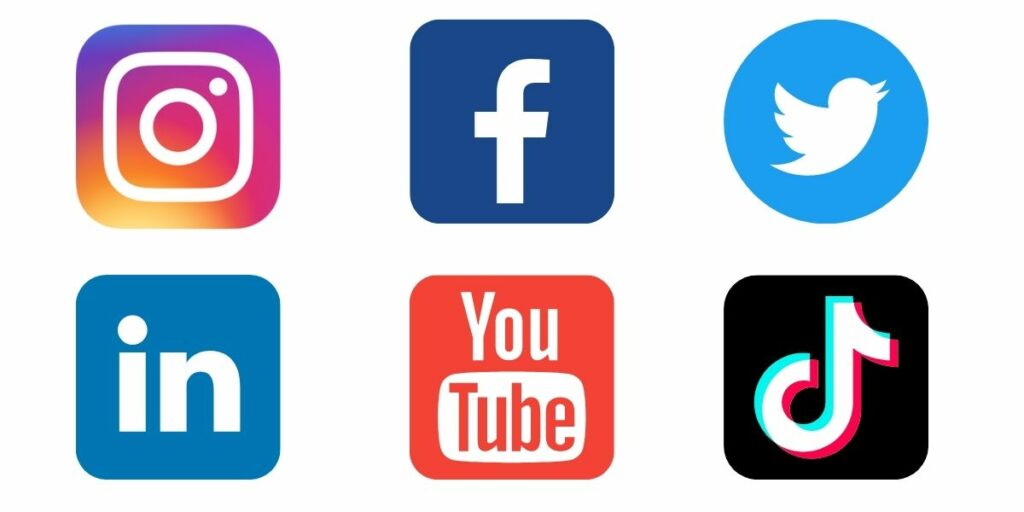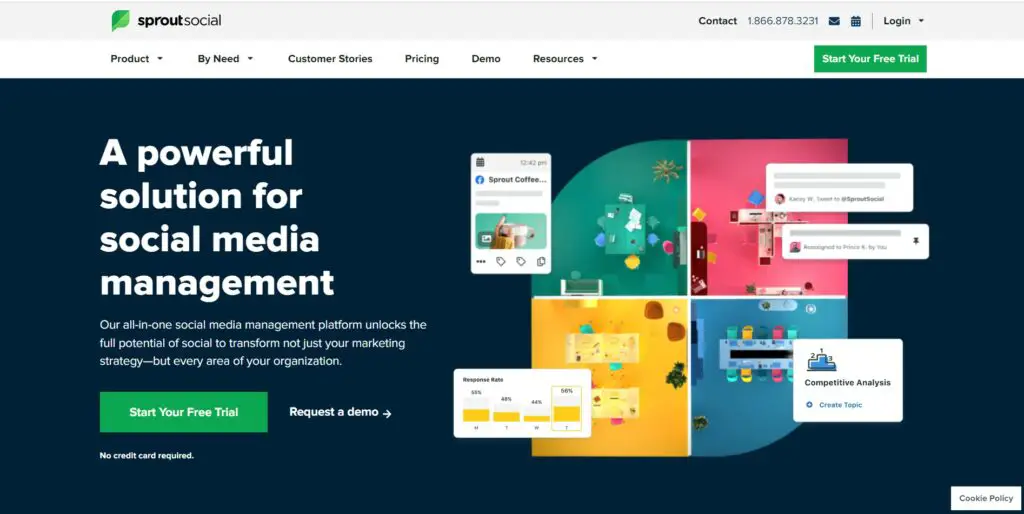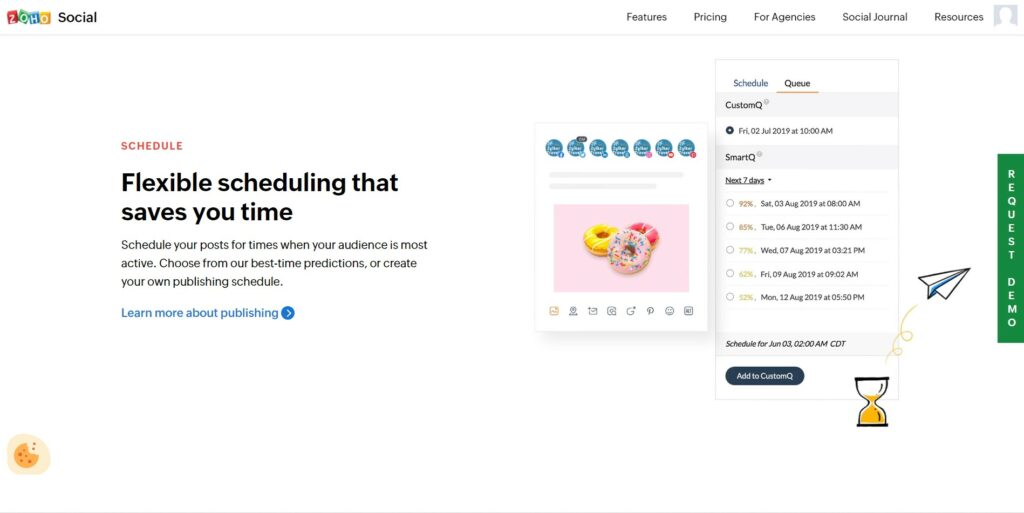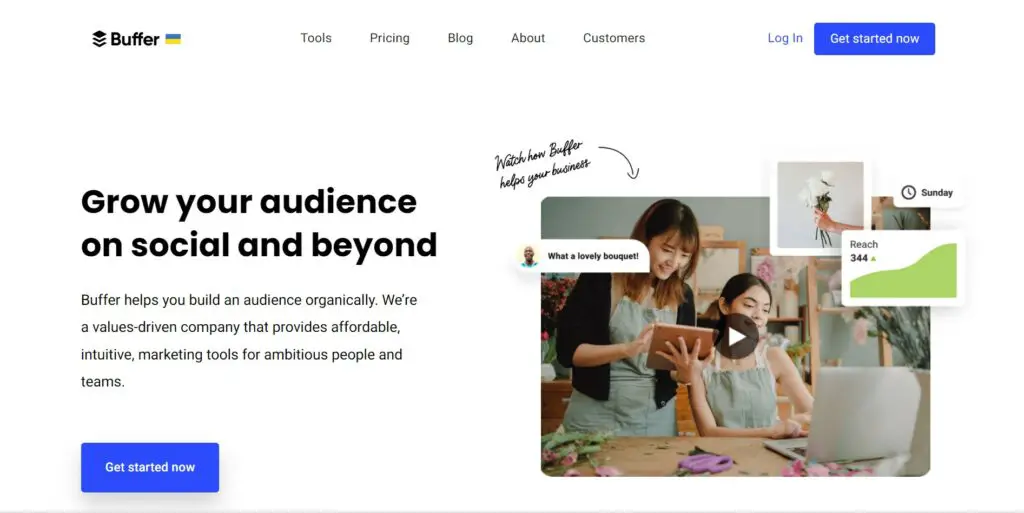Disclaimer: We sometimes use affiliate links in our content. For more information, visit our Disclaimer Page.
Are you a small business owner struggling to keep up with social media? Do you feel you’re wasting time posting and tweeting and not getting the results you want?
You’re not alone. Managing social media can be overwhelming, especially for businesses that don’t have the staff or resources.
But it’s important to stay involved to connect with your customers and grow your business. So what can you do?
Here’s an in-depth guide to social media management. Then, we’ll discuss how business owners can use social media to generate sales and establish their online presence.
So whether you’re getting started or looking for ways to improve your social media strategy, this guide will help you out!
Why Does Your Business Need a Social Media Strategy?
Social media is an excellent way to connect with your target audience. If you are not using social media to communicate with your customers, you miss out on a valuable opportunity. You can use social media to build relationships and grow your business.
In today’s business world, social media is no longer optional. Businesses need to have an active presence on Facebook, Twitter, and Instagram to stay competitive.
Some small businesses shy away from social media, thinking that it’s too time-consuming or not worth the effort. However, the truth is that an effective social media strategy can be a game-changer.
Businesses can connect with potential customers, build relationships, and drive sales through social media. In addition, social media provides a level playing field for small businesses, allowing them to compete with larger companies on an equal footing.
Finally, it’s important to remember that social media is not a static platform; it’s constantly evolving. So if you want to stay ahead of the curve and keep your business relevant, you need to be active on social media.
So if you’re still on the fence about whether or not your small business needs a social media strategy, hopefully, these points have convinced you of the importance of making social media a priority.
Related: Business Marketing Plan
How to Create Social Media Marketing Strategies for Small Businesses

Social media is a powerful tool for promoting your brand and connecting with customers. However, creating an effective social media strategy with so many platforms to choose from can be challenging. To help you get started, here are six tips for creating a social media strategy for small businesses:
1. Set clear objectives.
Before you start creating social media content, it’s essential to take some time to think about your objectives. What do you want to achieve with your activity?
Are you looking to increase brand awareness, drive website traffic, or generate leads? Once you know what you’re hoping to achieve, you can create content relevant to your target audience, which will help you reach your business goals.
For example, if you’re trying to increase brand awareness, you’ll want to create shareable content to reach a broad audience.
But, if you’re trying to drive website traffic, you’ll want to create optimized content for search engines, which will lead people to your website.
If you’re unsure what your objectives should be, take some time to research your competition and see what they do on social media. You can also talk to a marketing professional for guidance. Once you have clear objectives, you’ll be well to social media success.
2. Identify your target audience.
Who are you trying to reach with your social media activity? What are their demographics, interests, and needs? Creating buyer personas can be helpful in this process. In addition, identifying your target audience will help you determine which platforms are most likely to reach them.
Once you have a clear understanding of your objectives and target audience, you can start to create content that will resonate with them.
Remember to focus on quality over quantity and provide value in every piece of content you create.
3. Choose the right platform.
Deciding which social media platform to use for your business can be challenging. There are a lot of factors to consider, and it’s crucial to do your research to figure out which platform is most popular with your target audience.
For example, if you’re targeting millennials, you’ll need to be active on Snapchat and Instagram. On the other hand, Facebook and LinkedIn are better options if you’re targeting baby boomers.
The key is to figure out where your target audience spends the most time online and then focus your efforts on that platform.
4. Be consistent.
Posting content regularly is vital for maintaining a presence on social media. Moreover, it also makes it more likely that your followers will see your content.
Of course, posting too often can be just as bad as posting too little, so it’s crucial to balance. A good rule of thumb is to post at least once a week, though more frequently is better.
You can also use scheduling tools to help you plan and space out your posts ahead of time. Consistent with your postings will ensure that your social media presence remains strong.
5. Engage with your audience.
It’s important to remember that social media is a two-way street. If you’re only posting content and never engaging with your followers, you’re not taking advantage of all that social media offers.
Make sure to take the time to respond to comments and questions. This helps build relationships with your followers and makes them more likely to return to your page in the future.
When you engage with your audience, you’re also more likely to get feedback that can help you improve your content and better understand what your followers are looking for.
6. Measure your success
There’s no point in investing time and effort into social media if you don’t have a way to measure your success. So before you launch your campaign, take some time to consider what metrics you will use to track your progress.
Some common metrics you may want to track include:
- Engagement rates (likes, comments, shares, etc.)
- Reach (how many people see your content)
- Click-through rates (how many people click on links in your posts).
Some factors that you may want to consider to measure success include the number of new followers you gain, the engagement rate of your posts, and the reach of your content.
Using social media to generate leads or sales, you’ll also want to track how many leads or sales are attributed to your campaign.
By monitoring these metrics over time, you’ll see how well your social media strategy is performing and make adjustments as needed.
Related: Social Media Marketing
Top 6 Social Platforms

Instagram has indeed established itself as a formidable force in the digital marketing arena. Its rapid user base growth, reaching over 2 billion monthly active users, positions it as a critical platform for small businesses looking to tap into a large and diverse audience.
The platform’s demographic spread is particularly noteworthy for businesses. A significant portion of Instagram’s user base falls within the 18 to 34 age group, comprising 61.8% of the total audience. This underscores Instagram’s appeal to a younger, dynamic demographic, making it a potent tool for brands targeting Gen Z and Millennials.
Instagram’s global reach is another key aspect. With the highest number of users in countries like India (358.55 million) and the United States (158.45 million), followed by Brazil, Indonesia, and Turkey, it offers businesses the opportunity to connect with audiences not just locally but also internationally.
The average time spent on Instagram is also significant. Users spend an average of 30.1 minutes per day on the platform, indicating a highly engaged user base. This level of engagement is beneficial for businesses as it increases the chances of their content being seen and interacted with.
Another critical aspect of Instagram is its feature set, particularly Instagram Stories and Reels. With more than 500 million people reachable through ads on Instagram Stories and a significant number of marketers using Instagram Reels for influencer marketing, these features offer businesses creative and impactful ways to engage with their audience.
Additionally, the platform’s emphasis on visual content, with 69.9% of users posting or sharing photos and videos, makes it a prime channel for businesses to showcase their products and services in a visually appealing manner.
Finally, Instagram’s gender distribution is well-balanced, with 51.8% male and 48.2% female users, suggesting its appeal across genders. This diversity further enhances its value as a marketing platform, allowing businesses to reach a wide spectrum of customers.
In summary, Instagram’s expansive and engaged user base, combined with its powerful features and broad demographic reach, make it a highly effective platform for small businesses to increase their visibility, connect with a diverse audience, and drive growth.
Facebook’s vast reach and diverse user base make it an invaluable platform for small businesses seeking to expand their marketing efforts. With over 3 billion monthly active users globally, Facebook stands as the most used online social network. Notably, the median age of Facebook’s advertising audience is 32 years, indicating a broad age range of potential customers.
In the United States, Facebook’s usage is particularly significant. About 63.7% of the U.S. population aged 13 and above use Facebook, totaling around 210 million Americans. This platform is used by 74.2% of all U.S. consumers, more than any non-Meta-owned platform like TikTok, which is used by 42.4% of the U.S. population. Furthermore, 58% of Facebook’s users are under the age of 35, encompassing Millennials and Generation Z.
Regarding device preference, a staggering 98.5% of Facebook’s audience aged 18+ accessed the platform via a mobile phone as of July 2021, and only 16.7% accessed it via laptops or desktop computers. This underscores the importance of optimizing content for mobile devices.
Users spend an average of 33 minutes daily on Facebook, translating to about 990 minutes every month. Additionally, Facebook groups are a hotbed of interaction, with 1.8 billion people engaging in them monthly. Interestingly, the engagement rate for image posts on Facebook is the highest at 0.13%, followed by status posts at 0.11% and video posts at 0.08%.
Regarding advertising on Facebook, the platform has the potential to reach 2.11 billion people through ads, covering approximately 70% of its user base. This potential is bolstered by the fact that 55.7% of active Facebook users engage with the platform for following or researching businesses and products.
These statistics highlight Facebook’s immense potential as a marketing tool for small businesses, offering diverse ways to connect with a broad audience, create engaging content, and leverage powerful advertising tools to reach specific demographics effectively.
Twitter, often overlooked in the realm of social media marketing, holds significant potential for small businesses. As of 2023, Twitter boasts 528.3 million monetizable monthly active users, a figure projected to reach 652.23 million by 2028. This expansive audience presents small businesses with a vast potential for reaching a wide range of customers.
The demographic breakdown of Twitter’s audience is particularly noteworthy for targeted marketing. The platform is predominantly male, with 56.4% male users and 43.6% female users. The largest demographic segment on Twitter falls within the 25 to 34 age group, comprising 38.5% of its user base. This suggests a significant presence of young adults, which can be a key target demographic for many businesses.
Twitter is unique in its concise content style, with tweets being short and to the point. This makes it an ideal platform for sharing quick updates, news, and special discounts. Additionally, Twitter’s search function enhances discoverability, allowing customers to easily find and learn about businesses.
Moreover, Twitter’s real-time nature facilitates swift responses to customer queries and concerns, enhancing customer service and engagement. For networking and industry connections, Twitter stands out as well, providing opportunities for businesses to connect with peers and influencers within their sector.
From an advertising perspective, despite a challenging period in recent times, Twitter continues to offer diverse advertising options. These include promoted Tweets, accounts, and trending topics, catering to different marketing needs and strategies. Although there’s been a decrease in ad engagement and an increase in cost per engagement, Twitter’s ad view time remains 26% higher than other leading platforms, indicating a still-engaging environment for advertising.
In conclusion, Twitter’s large and diverse user base, coupled with its unique features for quick communication and high engagement, makes it a valuable platform for small businesses seeking to enhance their social media presence and marketing effectiveness.
LinkedIn has evolved into more than just a platform for job seekers and large businesses; it’s now a vibrant space for B2B and even B2C marketing. As of April 2023, LinkedIn boasts over 922.3 million members globally. The United States alone has 200 million registered LinkedIn members, making it the country with the highest number of users, followed by India with 100 million, and Brazil with 62 million.
The platform’s user base is mainly concentrated in the 25 to 34 age group, which accounts for 55.8% of LinkedIn’s total ad audience. LinkedIn’s audience has a fairly balanced gender distribution, with 56.8% male and 43.2% female users globally.
LinkedIn is recognized as the leading platform for lead generation, especially in the B2B sector. It’s a highly effective channel for driving high-quality leads, with 97% of B2B marketers using LinkedIn for content marketing. The platform has proven to be a powerful tool for generating leads, with 89% of B2B marketers using LinkedIn for this purpose and 62% reporting successful lead generation.
YouTube
YouTube, often associated with entertainment and video content, is also a valuable tool for small businesses. It offers a platform for creating engaging content, from product demonstrations to customer testimonials. The ability to add annotations, live stream events, and interact with audiences through comments, likes, and shares makes YouTube a dynamic platform for businesses to tell their story and connect with customers.
On YouTube, businesses have access to various tools for measuring performance and tracking results, allowing for strategic content planning and audience engagement. The platform’s features support a range of content types and engagement methods, catering to different business needs and marketing strategies.
Both LinkedIn and YouTube provide unique advantages for small businesses. LinkedIn’s strength lies in its vast professional network and capabilities for B2B marketing and lead generation, while YouTube offers a creative and interactive platform for engaging with a broader audience through video content. Each platform can be effectively leveraged depending on the specific goals and target audience of a small business.
Tiktok
TikTok, a short-form video-sharing app, has become a prominent platform for businesses to engage with potential customers creatively. With over 1.7 billion monthly active users globally, its vast user base is not limited to younger audiences, making it an invaluable marketing tool for small businesses.
The platform’s emphasis on creativity and human connection sets it apart. Small businesses can forge strong relationships with their audience by crafting compelling content, which can boost sales and enhance brand recognition. TikTok’s algorithm, which prioritizes creative and personalized content, aids businesses in gaining visibility among a large audience.
Another advantage for small businesses on TikTok is the array of features it offers. These include options for running targeted advertisements and accessing detailed analytics, enabling businesses to fine-tune their marketing strategies effectively.
The high level of user engagement on TikTok means that businesses have the opportunity to reach numerous potential customers swiftly and effectively. This high engagement rate, combined with the platform’s diverse demographic, presents a fertile ground for small businesses to expand their reach.
Given these attributes, it’s clear why small businesses are increasingly leveraging TikTok to attract new customers and grow. Its unique blend of creativity, user engagement, and business-friendly features makes TikTok an essential tool in the modern small business marketing arsenal.
4 Best Social Media Tools for Small Businesses
If you’re a small business owner, you’re always on the lookout for new and effective ways to market your products or services. And in today’s digital age, there’s no better place to start than social media.
There are hundreds of social media platforms out there, so it can be tough to know which ones are worth your time and energy. To help you make the most of your social media marketing efforts, here are four of the best social media tools for small businesses:
Sprout Social

Managing social media accounts can be a full-time job, and most small businesses don’t have the resources to spare.
That’s where Sprout Social comes in. It’s everything a small business needs to manage its social media presence effectively – and it’s all available at a price that won’t break the bank.
In addition, the package offers a wide range of features and benefits that are designed to help businesses grow their online presence.
Sprout Social takes the guesswork out of social media management, allowing them to focus on running their business.
With its easy-to-use interface and wealth of resources, Sprout Social is the best choice for small businesses looking to take their social media game to the next level.
Related: Sprout Social Review
Zoho Social

Zoho Social is a social media management tool that helps you effectively manage your social media accounts. With Zoho Social, you can schedule unlimited posts and create custom reports to analyze your social media performance.
With its intuitive interface and powerful features, Zoho Social makes it easy to control your social media presence and maximize your reach.
Additionally, Zoho Social’s engaging content library ensures that you always have fresh and relevant content to share with your audience.
Hootsuite

Hootsuite offers a wide range of features for managing your social media accounts, including scheduling posts, monitoring keywords, tracking analytics, etc.
The platform is also easy to use, even for those with limited experience with social media management tools. In addition, it offers training and support for users new to social media management.
And compared to other social media managers, Hootsuite is very affordable, making it an excellent option for small businesses and individuals on a budget.
Thanks to its comprehensive feature set and user-friendly interface, you’ll be up and running. And if you ever need help, the Hootsuite community is always there to lend a hand.
Buffer

Between running your business and managing your personal life, it can be tough to find the time to post on social media regularly.
That’s why many businesses are turning to social media managers like Buffer. Buffer makes it easy to post content across all of your social media channels, including Facebook, Twitter, LinkedIn, and Instagram.
You can also schedule posts in advance and track your analytics to see what’s working and what’s not. And unlike some other social media managers, Buffer has a great mobile experience so that you can post on the go.
Plus, Buffer’s customer service is top-notch if you need any help along the way. If you’re on a tight budget, Buffer is worth checking out.
Benefits Of Using Social Media For Small Businesses

Social media has become an integral part of our lives, and its impact is only growing. For small businesses, harnessing the power of social media can be a game-changer. Here are four ways that social media can benefit your business:
1. Generating Brand Awareness
A solid social media presence is a great way to get your brand in front of more people. When users see your content, they’ll become familiar with your brand and what you have to offer.
If they see that you’re consistently putting out high-quality content, they’ll start to trust your brand and be more likely to buy from you in the future.
In addition, social media presence can also help you reach out to new potential customers who may not have been aware of your brand before.
Therefore, making sure that your social media accounts are active and engaging is a great way to generate brand awareness and reach a larger audience.
2. Increasing Site Traffic
Increasing site traffic can be a challenge for any website owner. After all, why would users bother to visit your site when there are millions of other websites out there? One way to encourage users to visit your site is by sharing your content on social media.
By posting links to your articles, blog posts, and other web pages on social media, you can give users a reason to click through to your site. Plus, you can use social media to run promotional campaigns and drive even more traffic to your website.
For example, you could offer a discount code to users who visit your site on social media. By using social media effectively, you can encourage users to visit your site and explore what it has to offer.
3. Selling Products And Services
The internet has changed how we do business, and social media has played a significant role. These days, you don’t need a physical storefront to sell your products or services – you can do it all online through platforms like Instagram and Facebook.
This is great news for businesses, as it opens up a whole new world of potential customers to reach. Also, by setting up a shop on one of these platforms, you can make sales without any overhead associated with a brick-and-mortar store.
Plus, social media provides an easy way to connect with potential customers and build relationships with them.
4. Low-cost brand recognition
By investing time and resources into creating low-cost brand recognition, businesses can reach new heights without breaking the bank.
Customers are increasingly turning to social media to find out about new products and services, so businesses need to have a presence on Twitter, Facebook, and Instagram.
By regularly posting engaging content and interacting with customers, businesses can build up a following of loyal fans who are more likely to convert into paying customers. In today’s competitive landscape, low-cost brand recognition can be the difference between success and failure.
Related: How to Generate Leads for Your Business
Social Media Tips For Small Businesses

1. Lead with goals & objectives
Before diving into social media, small businesses should take a step back and think about their objectives.
What are the three most important things they want to achieve? Once they have a clear answer, they can evaluate how social media can help.
For example, if their goal is to increase brand awareness, they might create a profile on a large platform like Facebook or Instagram and post regular updates.
If their goal is to drive traffic to their website, they might focus on platforms like LinkedIn, where users are more likely to click on links. Small businesses can ensure that their social media efforts are focused and effective by starting with objectives.
Your authority is like a currency. The more you have, the more you can cash in on growth opportunities.
To build your authority, start by becoming an expert in your field by sharing your knowledge with others through speaking engagements, writing articles, or leading workshops. As you establish yourself as an expert, maintain a professional appearance and demeanor.
This will help you build trust and credibility with others. In addition to becoming an expert, it is also essential to develop strong relationships with others in your field.
Forming alliances and networking with influential people will help increase your visibility and further establish your authority.
3. Show appreciation
One of the simplest and most effective ways to show appreciation is through social media. If you think about the 10 to 20 most influential people in your business, the chances are good that many of them are active on major social media platforms like Twitter and LinkedIn.
By recognizing and recognizing and recognizing them for their contributions, you can show that you value their partnership and reaffirm your commitment to working together.
Additionally, other people who see your posts and shares will positively impact your business. So, expressing appreciation benefits your relationships and can also help improve your reputation and build goodwill.
Imagine having a month’s worth of content ideas, topics, and blogs ready to go with minimal effort. This is what a content calendar can do for your business and social media presence.
By taking some time upfront to map out what you want to say and when you want to say it, you can lay the foundation for a more prosperous, engaged, and consistent social media strategy that will save you time in the long run.
Plus, you can use your calendar to track your progress and measure your results over time to continue to refine and improve your approach.
5. Don’t try to do it yourself
Trying to run a small business is hard enough without having to add social media management to your list of responsibilities. Fortunately, there are plenty of options for delegating this work to someone else.
You can assign it to an employee or team or hire an outside expert. Either way, make sure to add the cost of your social media strategy to your budget. Otherwise, you risk stretching yourself too thin and not being able to give your business the attention it deserves.
Related: How to Promote Your Business Locally
Closing Thoughts
As the use of social media continues to grow, so does its importance as a tool for small businesses. While managing social media can be time-consuming and challenging, the benefits outweigh the costs.
Businesses can connect with customers through social media, build relationships, and create a loyal following. In addition, social media provides an affordable way to reach a broad audience and promote products or services.
Ultimately, managing social media is essential for small businesses that want to stay competitive and succeed in today’s market.
With a little effort and some creativity, businesses can use social media to reap the rewards of increased exposure and customer engagement.





